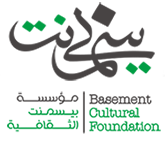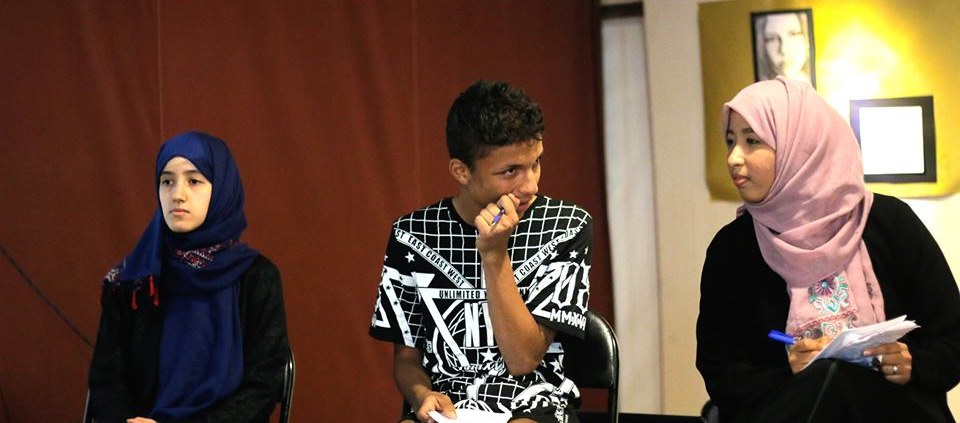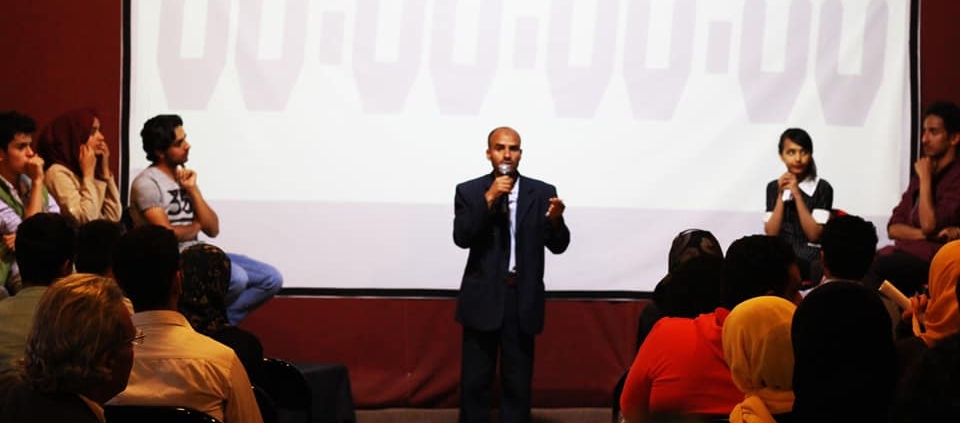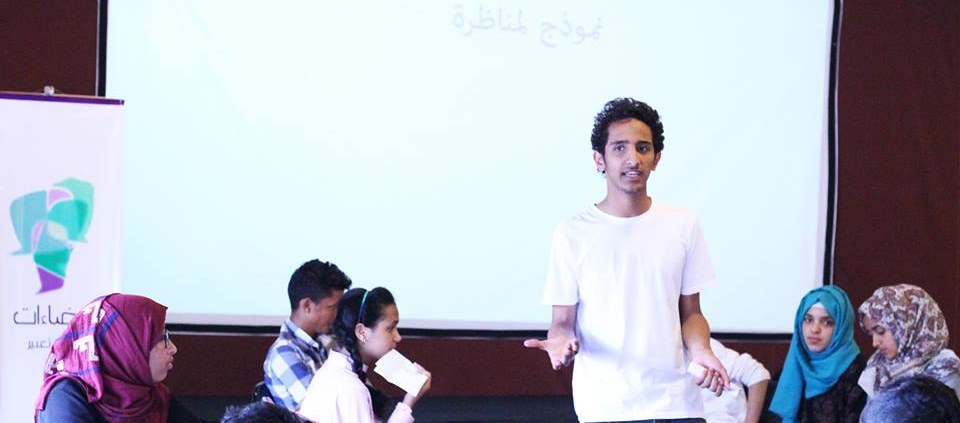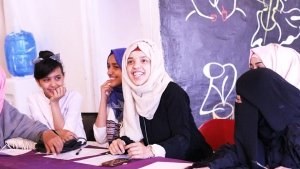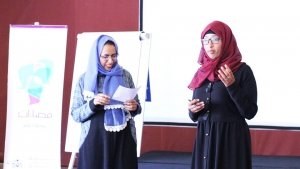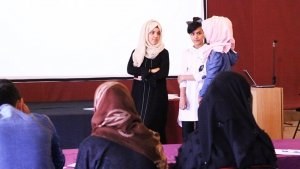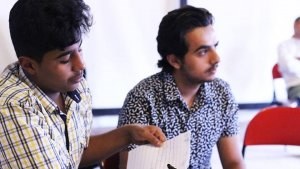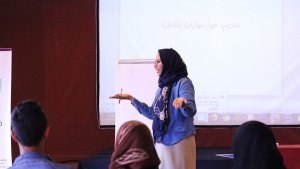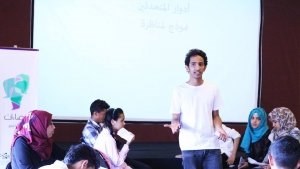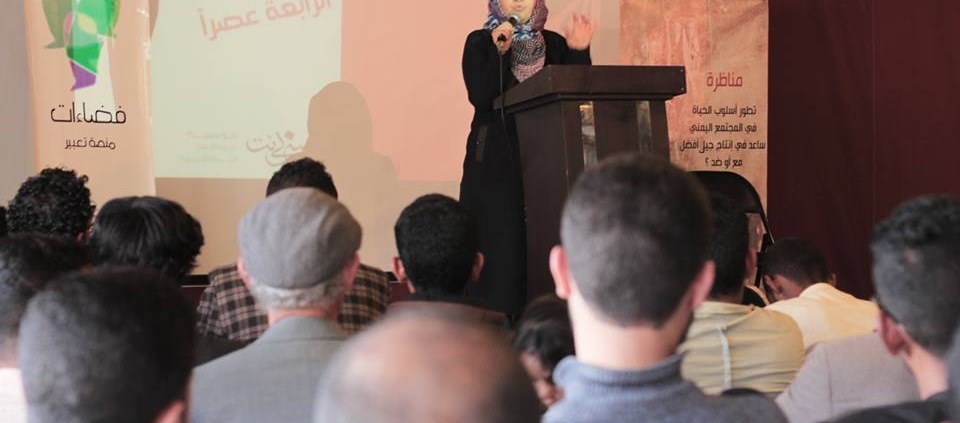Training in Debate Skills for Youth
On Monday and Tuesday, February 19-20, 2018, Basement organized a training workshop within the Spaces project, in which debates will discuss various issues of interest to the community.The training workshop targeted school students, and participants were selected through participation forms based on their interest in the field of debate, and their participation In debates in schools.
The workshop was attended by 18 participants (8 girls, 10 boys) between the ages of 15 and 20, and exceeded the number that Basemant had previously announced (6 trainees), to train 18 participants to benefit the largest number of target group wishing to acquire this Six of them will be selected to participate in the Basement Cultural Foundation debate in March. Basement has strived to balance the number of male and female participants and has trained them: Jihad Babrik and Shaima Gamal. The training dealt with several axes, the most prominent of which was to provide a general background on the debate (definition, types, benefits, models), and the trainers then touched on the method of debate, and the art of speech, which included the presentation of models of influential speeches throughout history, and discussed the participants on the difficulties that may confuse them During their speeches as stage fright, the uproar that the audience might make, the lack of information. The trainers provided them with assistive techniques to overcome these difficulties. They were applied in the practical exercises that took the most part in the workshop, and the participants were practically trained in preparing the content of the debates (thesis, argument, refutation).
On the second day of the course, the trainers Jihad Babrik and Shaima Gamal completed the course in the field of debate, where the practical application of what the participants learned, and the embodiment of a virtual debate. Shaimaa Gamal presented the participants with the different types of debates and the difference between them, the mechanism of conducting the debate, the distribution of roles between the team, the role of each speaker, the importance of the public and its role in measuring the reaction and the ability of the participants to convince. Shaima pointed out that the method of debate currently followed by the Foundation is the British method, which opens the door for interventions and the right of objection during the talk, and does not adhere to a specific time.
Shaima stressed during the training that the importance of the debate is not to win the majority of the public vote, but to gain participants confidence and the ability to present arguments and persuasion, as the debate as it gives the speaker the ability to intellectual criticism, and gain a lot of skills in his public life. The participants then presented practical debate in which they talked about issues of interest to them, which were commented by the trainers Jihad and Shaima, and gave the participants feedback for improvement in performance and presentation of data.
The researcher and trainer, Mr. Tawfiq al-Jund, participated in a quick intervention in which he spoke to the participants, advising them to put themselves in the other party’s place during the debate. He also advised them to always seek the truth in their lives and reflect on the facts of life. In the last part of the course, participants were given time to prepare for a full-fledged debate based on the information and observations provided to them on the training days, and were distributed in teams supporting and opposing the three selected issues: (Should women have a greater role in society versus men ?, Should young people be given the right to vote? Is education in private schools more efficient than public schools?). The participants proved that despite their young age their ability to talk and persuade and refute arguments, and to inform them of a lot of information and facts, and benefit from what they learned in this session.
Basement will organize a debate next month to bring together the selected youth.
“?Debate on “Positive discrimination for women, with or against
On 23 August 2017 Basement selected 8 out of 21 participants where the selected process was very difficult for Basement team. The selection has been made on several axes:
1. Serious participation and enthusiasm during training.
2. Method of building arguments.
3. Good speech.
4. Good attendance.
Participants who were chosen:
Group who support the dissertation:
1- Aisha Jarallah, 28 years old, graduate of the Faculty of Commerce – Sana’a University.
2 – Yasmine Al-Sayyad, graduate of the Department of English Languages and holds an international and administrative development masters.
3. Haifa Ahmed, age 26, graduate of the Oral and Dental Surgery Department at Sana’a University. She works as a dentist.
4 – Shaimaa Hassan, 22 years old, medical student, member of the Takaful campaign.
Group who opposes the dissertation:
1. Nusseibeh al-Makhlafi, 21 years old, a nutritionist and dietitian, active in civil society organizations.
2 – Rana Abdullah, 25 years old, graduate of accounting – University of Sana’a, interested in community work.
3- Samira Al-Zahri, has diploma in family and psychological guidance, she has several courses in the field of human rights and women in particular.
4- Iman al-Ghamiri, 27, graduate of oral and dental medicine, currently works in the private sector as a dentist.
On Saturday, 26 August 2017, the Basement organized a public debate on the subject of “Positive discrimination for women, with or against?” The debate gathered 8 participants discussed about the dissertation. Hisham Al-Asbahi was the moderator of the debate. More than 160 people attended the event.
{gallery}Spaces/D3{/gallery}
Workshop on positive discrimination for women-Spaces
On August 22, 2017, the Basement held a workshop on positive discrimination for women. The two authors Wedad Al-Badwi and Amel Ahmed attended to give the participants information about positive discrimination. Both writer gave them their reasons and explain their attitudes.
{gallery}Spaces/W31{/gallery}
Workshop on the skills and techniques of the debate-Spaces
Basement held a training workshop on the skills and techniques of the debate on Monday, August 21, 2017. The training targeted 21 participants selected from among the applicants to participate in the debate. The course was trained by Abdul Salam Al-Shuraihi. The course focused on:
– the definition of debate concept and the importance of it.
– The technique of debate.
– How to build an efficient argument.
– How to refute the arguments successfully.
{gallery}Spaces/W32{/gallery}
Debate – Is art a priority – with or against
On March, 2, 2017, applications for participate were received and names were sorted. Participants were
selected according to the information provided in resume and individual interviews. Six participants were
accepted:
The group, who support the dissertation:
1- Jihad Ba-brik, graduate of English literature.
2- Saleh Al- Awlaki, guitarist and graduate of business administration.
3- Amjad Abdullah, graduate of political science.
The group, who oppose the dissertation:
1- Samer Al-Absi, journalist and employee.
2- Safoun Al-Qabati, engineering student.
3- Mokhtar Abdullah, decorative engineer.
On May 13, 2017, Basement held the second debate entitled “Is art a priority – with or against” at 4:00 pm. More than 150 people attended the debate. The debate was moderated by Baha Al-aldin and Shaima Barakat, who
participated in the previous debate.
{gallery}/Spaces/D2{/gallery}
?Debate on -Does the Internet help promoting coexistence
On February 28, 2017, Basement selected six participants in the debate of “whether the internet promotes coexistence or not”. Names of the participants were selected:The group who support the dissertation were:
1- Shahab Al Masri, Telecommunication engineering graduate and CEO of Shift organization.
2- Aws Al Iryani, founder of group for design.
3- Bashir Said, Indentify himself as a “farmer”.
The group who opposed the dissertation were:
1- Jamal Hassan,writer and journalist.
2- Shaima Barakat, media student.
3- Bahaa Al- Din Abbas, graduate of Business Administration.
On March 23, 2017, Basement organized a debate on “Does the Internet help promoting coexistence? Six participants were involved. The debate was facilitated by Omar Al-Warfi.
{gallery}/Spaces/D1{/gallery}
Workshop in “Yemen’s Policies and Cultural Policies”
Basement organized a workshop on Wednesday, 22 March 2017, on “Yemen’s Policies and Cultural Policies”. Presented by the researcher and instructor in the field of public policy Tawfiq Al-Janad. The course dealt with several aspects of public policies in Yemen:
1- An overview and explanation of some policy concepts.
2- Yemen’s public policies, characteristics, and phases of creating.
3- The reality of public policies in Yemen.
4- How to evaluate public policies and then address the most important public
policies related to cultural affairs in Yemen.
{gallery}/Spaces/W3{/gallery}

